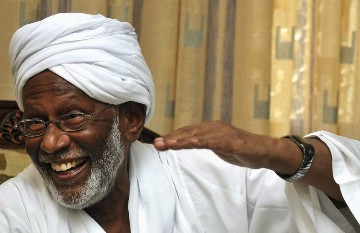Turabi says PCP relationship with SPLM stronger than ones with Khartoum government
July 21, 2013 (KHARTOUM) – Sudan’s Islamist opposition leader Hassan Al-Turabi praised the strong relations between his party and the South Sudanese ruling SPLM, and expressed hopes that the two countries will reunite in the future.

He expressed hope that relations with South Sudan remain strong despite the secession of July 2011, and to see visits between the two sides continue “even though people who went there were sent to jail (by the Sudanese authorities)”.
The Islamists leader was alluding to the 6-month detention of his deputy Ibrahim Al-Sanosi by the security service after a visit to Juba to meet with the rebel leaders in December 2011.
Turabi further predicted that the north and south will unite once again in the future under a democratic system, noting that the border between the two countries is very active unlike border areas with other neighbours.
Relations between Khartoum and Juba are marred by disputes over a number of issues left unresolved despite the independence of South Sudan in July 2011.
The two countries also trade accusations of support to rebel groups and Khartoum recently decided to stop the flow of South Sudan’s crude to the international market, in reprisal.
Turabi was once described as godfather of the Sudanese Islamist regime but following a political falling out with Bashir and his deputy Ali Osman Taha in 1999, he formed his own party and become a fierce opponent of the regime.
The Islamist leader said that all the political parties agreed to overthrow Bashir regime through a popular revolution.
He, however, warned against using military means, stressing the importance of arranging for the post-regime phase in order to prevent the occurrence of crisis similar to the ones faced by Egypt after the overthrow of Mubarak regime.
Sudan’s main political opposition parties are at odds with rebel plans to topple the regime by force. Also, the PCP disagrees with the other opposition forces and rebel groups over the future of Islamic law in Sudan.
Turabi believes that an Islamic regime is possible in the country and agreed with the others who call to separate politics and religion to establish an interim regime where human rights and fundamental freedoms are ensured, but only an elected parliament can decide on the Islamic law after the establishment of a new regime.
Referring to this issue, Turabi told his partisans that opposition parties have learnt from past mistakes and now have agreed that freedom is their main demand and whoever comes through the ballot should rule.
The opposition figure also addressed what he said were signs of a “revolution of the hungry” driven by government failure to develop agriculture and industry thus seeking to increase taxes and levies.
“You know what hunger does [to people]”, Turabi said.
(ST)
